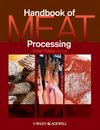CONTRACT SANITATION
Cleaning Up, Contracting Out
By Lynn Petrak, special projects editor
By engaging external services, processors aim for superior, documented sanitation programs.
There are plenty of third parties walking through meat and poultry plants these days, from government inspectors to quality-assurance consultants to laboratory scientists. In many processing facilities, sanitation professionals have become part of the increasingly collaborative teams that are working to ensure quality and safety at key points from slaughter to shipping.
Hiring outside crews to guarantee that equipment and surfaces are properly cleaned is not a new concept in the world of food manufacturing. But in an era when foodborne illness outbreaks, product recalls and fines are cutting into retail and foodservice customer confidence in the meat and poultry supply, many plant operators are shoring up their own efforts by engaging experts who can cover the same ground with advanced tools and technologies and who can not only conduct cleaning but manage and document the function.
Those who provide contract sanitation services say that more meatpackers faced with concurrent and critical issues of safety, labor and time have turned to third-party providers for assistance — and assurance.
Owen Patterson, vice president of operations for full-service national contract cleaning company Food Safety Services, says that operating environments in the last several years — intensifying lately — have caused operators to look outside their own walls.
“The demands in sanitation have shifted within HACCP to being more exact and correct with documentation, chemical titrations and better procedural training for product application. The alarming rate of product recalls makes it essential for documentation to provide ‘Proof of Clean’ for every customer,” he reports.
Jim Whitehead, general manager for Superior Contract Cleaners, reports that the match-up of processors with outside sanitation professionals is more of a synergistic relationship than a case of simply shifting roles and responsibility.
“I’ve been in and around [the meat- and poultry-processing] industry for the last 20 years, and in that period of time, the level of knowledge and expertise has increased dramatically, along with the requirements for achieving and maintaining levels of cleanliness and sanitation in order for companies to product the quality of products that they do,” he says, adding that elements like stringent sanitation procedures, documentation, training and comprehensive HACCP programs are ultimately intertwined to the benefit of the end product. The increasing presence of third-party safety and QA/QC auditors in meat-processing sites has grown in conjunction with interest in outside sanitation resources
“Third-party auditor requirements in some ways have exceeded the requirements of some of the government regulatory agencies,” comments Whitehead. Others agree that the uptick of third-party audits tracks with the utilization of contract sanitation.
“Our continued growth and success is a result of expanding our current food-safety and employee-safety programs. For example, one of the goals of our food-safety program is that all plants are ‘third-party audit-ready’ at all times,” says Dan Prellwitz, human resources director for Packers Sanitation Services. Prellwitz notes that that the sanitation company’s program enables a processor to successfully pass safety audits.
“Our clients may only go through one or two of these audits every year, but because we clean many food-processing plants every night, we are exposed to these virtually every week, and we understand what is required to meet their standards.”
In addition to third-party audits, Prellwitz underscores the impact of government representatives in meat and poultry facilities.
“A similar experience also holds true with OSHA inspections,” he points out, adding that although most operations undergo OSHA evaluations every few years, processors that work with outside sanitation professionals can benefit from those firms’ regular experience and familiarity with such inspections. As they ask for and answer to both government and privately hired agencies, many types of processing operations are contracting with independent sanitation professionals.
“If you look at larger manufacturers, they use contract cleaners for a lot of their plants, while there also has been a big market for private companies that haven’t been part of any big mergers,” relates Whitehead, who says that the main benefits of going external are similar for many processors. “At a certain point, it is highly justified to outsource certain activities — it’s no different than contracting for trucking or, as it relates to your personal life, hiring an accountant.”
The upside to outside
As the appeal of contracting for sanitation services has grown along with certain challenges and trends in the industry, those that offer such programs highlight the various benefits of complementing internal cleaning efforts with dedicated professional crews and tools. Prellwitz, for his part, points to the simple fact that outside professionals are indeed independent.
“The benefit to our clients is that they get another set of eyes looking at their facility and additional expertise when challenges arise,” he remarks. The fact that those sets of eyes are trained to look for particular things is a key advantage too.
“Our main expertise is the management of labor coupled with our employee and food-safety programs,” he says.
Likewise, Patterson says that giving responsibility of certain functions to those best trained to do it makes sense, especially in today’s environment.
“The primary advantage to outsourcing sanitation in a company’s operation is to allow the manufacturer to do what they do best — get good product out the door — and fulfill their commitment to consumer quality,” he points out.
Whitehead stresses that aspect and adds that it is important to ensure that a contract sanitation firm is familiar not only with food-processing plants and systems, but also with those specific to the meat and poultry industry.
“The cleaning and sanitation part requires its own set of specialization and expertise whenever there is an issue, because instead of consuming resources of production people, we are able to offer that for them,” he explains. “We stick exclusively with food processors of some sort, because that is where our expertise is. I’d say 80 percent of our business is in meat and poultry.”
In addition to depth, the breadth of experience also can help a processor maximize the effectiveness of sanitation programs. Contract sanitation services typically offer a wide variety of services that can be applied at many points in the process — again, something that processors may not be able to do on their own.
Superior Contract Cleaners, for example, is a full-service provider offering options like an all-inclusive sanitation package that provides both extensive services and flexibility for production or scheduling changes. Among other features, the package encompasses on-site district, regional and corporate management, approved detergents and sanitizers, cleaning supplies and equipment, technical and safety consultations and daily operational inspections. In addition, beyond cleaning supplies, tools and execution, Superior Contract Cleaners can help with compliance with regulatory authorities like the U.S. Department of Agriculture (USDA) and the Food and Drug Administration (FDA) and can help develop and implement SSOPs and offer support for internal and external customer audits.
Meantime, Food Safety Services, according to Patterson, offers services like on-site management, labor, chemicals, supplies and technical services. “The customer should only provide the water,” he says.
Packers Sanitation Services, too, emphasizes its full range of services, including cleaning and sanitizing, training and technical assistance and safety management programs. The company also supplies written food-sanitation procedures, via a written procedure manual customized to a processors’ needs and featuring step-by-step accounts of sanitation steps used in each area of the plant.
As part of their respective packages, many contract sanitation companies are able to leverage partnerships with other providers related to cleaning, sanitation and safety. Prellwitz points out that Packers Sanitation Services has had an exclusive partnership with cleaning, sanitizing and maintenance supplier Ecolab Inc. since 1997. Food Safety Services partners with Alex Fergusson, Inc. (AFCO), to receive new sanitizers, equipment capability, intervention technologies and bulk delivery systems, so customers do not have to store product containers on their property.
The tools and tech
Because they position themselves as experts, contract sanitation companies regularly invest in new tools and technologies to help keep plants clean and to validate sanitation efforts.
Such firms also keep on top of trends in the meat-processing industry to ensure that what and how they use in a plant works best. Whitehead, for instance, reports that contract sanitation companies are helping users keep labor costs down through new approaches and technologies.
“Everyone is looking for new ways to automate certain cleaning functions and coming up with cleaning techniques needed to accomplish things [quickly],” he says.
Prellwitz points to other trends, like the attention paid to non-product contact services today, along with an increase in the use of stainless-steel equipment and the application of antimicrobial components like Micoban in plastic surfaces.
Finally, as they work with outside sanitation services, meat and poultry plant operators enter into formal contracts that can vary in length, depending on the supplier and the desired services. Whitehead notes that contracts with Superior Contract Cleaners are a one-year minimum and the company usually works on a three-year contract.
“We look at it is an investment in a long-term relationship,” he says.



Report Abusive Comment